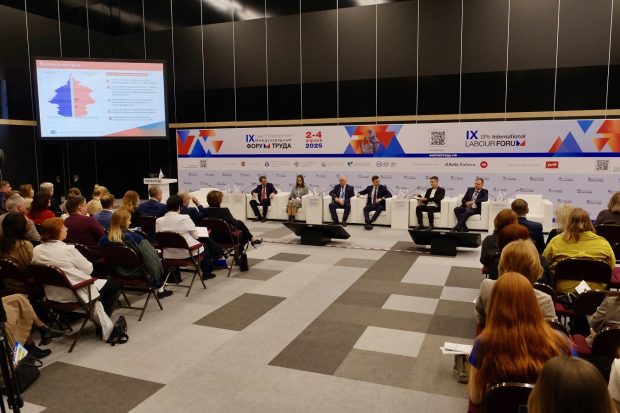The foundation of Russia’s reliable future lies in the development of human capital

Human capital is one of the main factors in the development of the economy of the future, the participants of the large plenary session «Human Capital. Investments in the Future», which took place during the IX St. Petersburg International Labor Forum at the Expoforum Convention and Exhibition Center. However, this capital will require large-scale investments.
The plenary session was moderated by Vladimir Knyaginin, Vice Governor of St. Petersburg.
Personnel training today will determine the economic development of the country in the future, said Andrey Kutepov, Senator from St. Petersburg, opening the plenary session. The responsibility for this lies with the regions, which must understand who and how they need to prepare, he stressed.
«As Federation Council Speaker Valentina Matvienko says, there is no need for everyone to go to Moscow, you need to learn how to realize yourself in the regions, at home,» Andrey Kutepov explained.
According to estimates by the Ministry of Labor, the country needs to prepare 3 million people for the labor market, the senator said, and for this it will be necessary to review the higher education system, since now every second university graduates lawyers, and even technical universities graduate PR specialists and managers.
All the other speakers agreed that in the 21st century, human capital is becoming the foundation of the economy along with technical equipment, but its development requires large-scale investments in the field of education. At the same time, it is necessary to solve the tasks of economic transformation at the expense of the country’s own potential, which means that priority should be given to Russian specialists, said Mikhail Ivankov, head of the Federal Service for Labor and Employment. He spoke about targeted training, the professional development system and the reform of the employment service as measures to achieve these goals.
At the same time, it is necessary to find a balance between training our own specialists and attracting foreign citizens.
«A large number of industries are in need of workforce, including low-skilled one,» admitted Aleksander Gorovoy, First Deputy Minister of Internal Affairs of the Russian Federation, «despite the fact that we have recently taken multiple measures aimed at restricting the entry of illegal migrants into the country and deporting them, foreign citizens continue to travel to the territory of the Russian Federation.»
About 6.5 million of them are in the shadow employment zone, which has increased many times recently. And in those regions where the authorities imposed bans on the work of migrants in various industries, there was an immediate sharp increase in shadow employment, Aleksander Gorovoy noted.
However, Mikhail Ivankov noted in response that the fight against this phenomenon is being conducted more and more actively. There are indicators to identify signs of shadow employment, he said, and special commissions are working in all regions to identify and stop illegal employment. Over the past 3 years, more than 2 million people have been legalized, Mikhail Ivankov said.
A representative of the Indian Embassy suggested one of the solutions to the problem in his speech. «Russia is in need of labor, and India is ready to provide it. Thus, we will have an opportunity for mutually beneficial cooperation,» he suggested, assuring that all migration from India is legal and the Indian side fully controls this process.
Anna Tsivileva, Deputy Minister of Defense of the Russian Federation, reminded that one should not forget about veterans of a special military operation who, after the return, also want to benefit in civilian life: «It is important to think about where to find an application for their skills and knowledge.»
And the chairman of the Federation of Independent Trade Unions, Sergey Chernogaev, in turn, advised involving trade unions in discussing salary and education issues.
«The trade unions believe that a person’s continuous professional development should begin at school and be based on the development of flexible competencies,» said the Federation leader.
Since about the middle of last year, the labor market has been moving into a new stage, Dmitry Puchkov, Director for development of the Avito Work platform, shared his observations: the number of job search ads is growing, and vacancies are falling. The salary race has been exhausted, the expert concluded, and it is economically impractical to continue it further. This means that new challenges for employers are, firstly, employee retention, which is more important than hiring new ones, and secondly, automation and robotization of all possible processes.
«Often, in order to retain an employee, it is enough to create comfortable conditions for him,» Dmitry Puchkov noted. The fact that the ratio of CVs and vacancies has almost equalized, and salary growth has noticeably slowed down, was also noticed on the hh.ru portal. Dmitry Markelov, the GR director of the service, told about this.
In order for human capital to become the foundation of a reliable future, it is necessary to make a lot more efforts and solve many problems. And many participants noted the importance of synchronizing the training of labor personnel with the needs of the country. When choosing their path in education and training, citizens should be guided by the strategy pursued by the state, Dmitry Tikhonov, Vice Rector for Additional and Pre-university Education at the Polytechnic University, summed up at the end of the meeting.